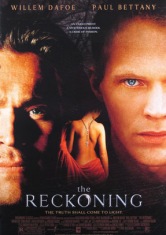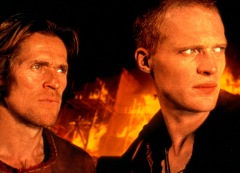| The Reckoning |
| |
 |
UK/Spain, 2004. Rated R. 110 minutes.
Cast:
Willem Dafoe, Paul Bettany, Gina McKee, Brian Cox, Ewen Bremner, Vincent Cassel, Simon McBurney, Tom Hardy, George Wells, Elvia Minguez
Writer: Mark Mills, based on the novel Morality Play, by
Barry Unsworth
Original Music: Adrian Lee
Cinematography: Peter Sova
Producer: Caroline Wood
Director: Paul McGuigan
LINKS
|
 first
heard the term “Morality Play” was when I was in grade school, during a dress
rehearsal for a school production of “The Battle of Jericho.” I was playing
the role of Rahab, the archetypal hooker with a heart of gold, who risks her
life by hiding Joshua's spies in her home. I wore a red robe, but remember asking
for a hood. Although I couldn't articulate it at the time, I thought it would
play better if after her valorous deed, Rahab removed the hood to emerge forgiven
for her past transgressions. My request was met with, “It's not a Morality Play,
dear. We don't really care about Rahab's world. We don't care what she has for
dinner, or how she grew up. We are just reenacting Biblical events. Plus, we
are out of red cloth.”
first
heard the term “Morality Play” was when I was in grade school, during a dress
rehearsal for a school production of “The Battle of Jericho.” I was playing
the role of Rahab, the archetypal hooker with a heart of gold, who risks her
life by hiding Joshua's spies in her home. I wore a red robe, but remember asking
for a hood. Although I couldn't articulate it at the time, I thought it would
play better if after her valorous deed, Rahab removed the hood to emerge forgiven
for her past transgressions. My request was met with, “It's not a Morality Play,
dear. We don't really care about Rahab's world. We don't care what she has for
dinner, or how she grew up. We are just reenacting Biblical events. Plus, we
are out of red cloth.”
What she was referring to were the theater productions that enjoyed great popularity during the Middle Ages in European towns. By this time, due in part to the spread of Christianity, the practice of the more hedonistic Greco-Roman theater traditions had been abandoned, and most plays assumed the form of liturgical pieces. Some acting troupes revised this genre to expose the essence of the Bible's more abstract themes. In Morality Plays, Evil need not be portrayed one-dimensionally (i.e., an actor in devil or serpent costume). Rather, it can be represented psychologically. An actor could now play a regular man, struggling with the themes of good and evil. This broke the form of acting wide open…and the need for new stories was born.

Willem Dafoe and Paul Bettany star in The Reckoning. |
The Reckoning (based upon the novel Morality Play, by Barry Unsworth) is set during this pivotal time in theatrical history, where art and real life merge again. Set in 14th Century Britain, a time of feudalism and Bubonic plagues, Nicholas (Paul Bettany) is a priest who has turned fugitive. We know that he has fornicated with a member of his congregation, but he is driven to run by a deeper, darker secret. While hiding in the woods, Nicholas is discovered by a traveling acting troupe, led by resident “master actor,” Martin (Willem Dafoe). After auditioning for their company, which includes the charismatic purist, Tobias (Brian Cox), and the enchanting Sarah (Gina McKee), Nicholas joins them for their next production.
The troupe stumbles upon a modest village in the midst of a most unusual tragedy. A deaf-mute woman (Elvira Minguez) has been sentenced to death for the murder of one of the town's younger boys. Martin sees this as a perfect opportunity for new subject matter. After winning the town over by a traditional play on “The Creation of Man,” Martin (in the service of writing material) and Nicholas (in the service of truth and appeasing his own guilt) investigate the crime, and discover there is more to it than originally thought. As more events and figures are unearthed, and as we come closer to discovering what is really causing Nicholas (a good man at heart) to flee, the troupe's Morality Play becomes exponentially more interesting, and actually might save a life.
It would logically follow that The Reckoning also becomes richer. It might have, had a more sophisticated director been at its helm. But Paul McGuigan (Gangster No.1, Playing Nintendo with God) never quite allows this richness to develop. Instead, he crams both story and theme down the viewer's throat. There is no room for interpretation, a pursuit that is vital to both the Morality play and the narrative film. For example, McGuigan periodically cuts to a dramatically lit Vincent Cassell, brooding silently in his tower. (Gee, who could the real murderer be?) Nicholas' character is obsessed with saving present and future lives. (Hmm, what could he be guilty of back home?) A moral debate about faith versus reason occurs between the film's “light” and “dark” characters. Dark shouts, “Oh, blind faith over reason, huh!”
There is some relief from this transparent storytelling. Unfortunately, it arrives in formalistic sequences in which our troupe dramatically prepares to A-C-T! We see powerful, close-up shots of Cox applying very bright, devil make up, and looking into the camera with the all the subtlety of Rambo tying on his headband. We see masks being applied, and Dafoe stretching—repeatedly. (Bravo to Mr. Dafoe for his malleability, but how did his character pick up Yoga?)
The Reckoning features competent and serious actors (although Dafoe's dialect seems to wander through all the regions of the UK, with a few side trips to Wisconsin, and back again.) Bettany's performance is engaging throughout, and Cox's theatrical career serves his character well. However, the climax of the film grandstands so brazenly, it requires the entire cast to overact.
The Morality Play does deserve some examination on the screen. It was an invaluable step in the evolution of Acting and Theater, and during a very bleak period in history, it affirmed the power of Art. It's a shame this director has not yet learned there is also power in Subtlety.
Review
© March 2004 by AboutFilm.Com and the author.
Images © 2004 Paramount Classics. All Rights Reserved.


